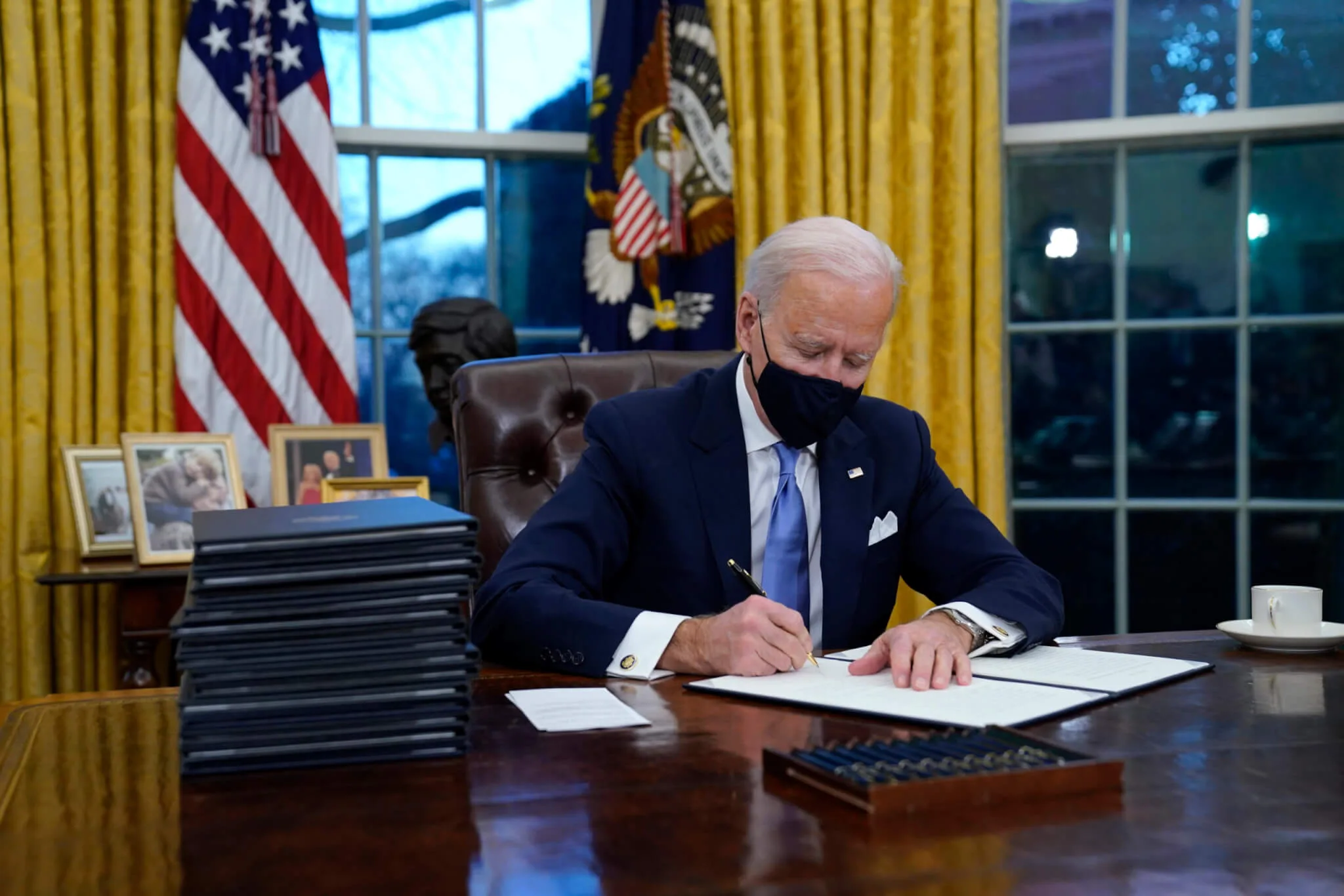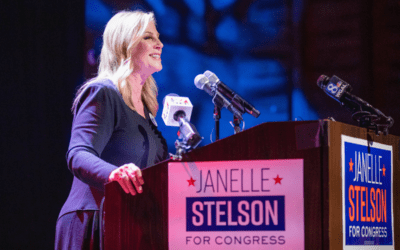
President Joe Biden signs his first executive order in the Oval Office of the White House on Wednesday, Jan. 20, 2021, in Washington. (AP Photo/Evan Vucci)
A lot of Biden’s plans—and how they will affect the Keystone State—are centered on grappling with the novel coronavirus pandemic that has ravaged the state and nation.
What does it mean to Pennsylvanians now that Joe Biden is president, particularly as he races to implement important programs in his first 100 days?
A lot of Biden’s plans—and how they will affect the Keystone State—are centered on grappling with the novel coronavirus pandemic that has ravaged the state and nation.
Pennsylvania has already seen 20,128 deaths from coronavirus-related issues. Meanwhile, 788,834 Pennsylvanians, or roughly one out of every 16 residents, have tested positive for the virus.
Biden also has plans to help working families with relief money, a student loan payment freeze, and an extension of the eviction moratorium. Biden also wants to increase the minimum wage and rejoin the Paris Climate Accords.
The History of the First 100 Days
The concept of this 100-day evaluation period was born from President Franklin D. Roosevelt, who called Congress into a special session lasting about 100 days in 1933, during which he managed to pass 15 pieces of legislation aimed at his New Deal efforts to get people back to work after the Great Depression. Since then, the first 100 days of presidencies have been a mixed bag, often influenced by global or national events more than a president’s agenda.
Compared to Roosevelt, Biden is somewhat hampered. Democrats’ control of Congress is razor-thin and the Senate still has unseated members, but this has left Biden no less ambitious about his first 100 days than Roosevelt.
RELATED: It’s Official: The President Is a Pennsylvanian
In many ways, Biden is more ambitious. He aims to make phenomenal progress on one of the greatest crises in American history while pursuing a host of other reforms to improve the lives of Americans. And those goals, lofty as they are, could really change things in Pennsylvania.
Mask Up, America
One of the first things Biden did in the Oval Office is sign an executive order requiring masks be worn on all federal land and challenging the American people to spend the first 100 days masked. The “100 Days Masking Challenge,” as the proposal is called, also calls on state leaders to make similar executive declarations.
Research has repeatedly shown that wearing a mask helps stop the spread of COVID-19.
Pennsylvania has had fairly strong masking recommendations for its citizens since the start of the pandemic. Gov. Tom Wolf and state Secretary of Health Dr. Rachel Levine, whom Biden has picked to join his administration, remind people to wear their masks every time they speak publicly.
The Largest Vaccination Campaign in History
Over the next 100 days, Biden wants to see 100 million doses of the coronavirus vaccines administered.
That seems like a tall order when Pennsylvania, with a population of approximately 12.8 million people, reported only 23,600 vaccinations per day from Jan. 11-19. But leading coronavirus expert Dr. Anthony Fauci has said he believes that the lofty goal is attainable.
“I can tell you one thing that’s clear is that the issue of getting 100 million doses in the first 100 days, is absolutely a doable thing,” Fauci said on Meet the Press earlier this month. “What the president-elect is going to do is where we need be, to invoke the [Defense Production Act] to get the kinds of things they need, whatever they may be, be they tests, be they vaccines or what have you.”
RELATED: 100 Million Vaccine Doses in 100 Days: Is Biden’s Plan Achievable?
A success on this front could turn the coronavirus fight around.
As of Thursday, Pennsylvania had received 1,223,250 doses of the vaccines and administered 568,660 (41%) of them.
Wolf and Levine have addressed the issues of getting shots into arms several times in the past two weeks. Levine has said the federal government needs to get better at communicating when and where the doses will be sent. She has said she is optimistic the situation could improve under Biden.
A Bailout for the American People
Another $1,400 stimulus is a top priority for Biden. That’s just the beginning, though, as his recovery plan includes tax breaks for the poorest Americans and a boost to the minimum wage. That means a lot to working families who are struggling to get by.
It’s safe to say there weren’t many policy positions Trump and Biden shared, but both supported a $2,000 stimulus check for each American. Congress, on the other hand, only authorized $600, barely more than a quarter of what both the new and former presidents wanted. So Biden wants to make up the difference.
In the grand scheme of things, a single $1,400 payment isn’t life changing, but it can help ease the burden of poverty, at least in the moment.
Eviction Moratorium
Biden extended the federal eviction moratorium with an executive order this week. That will provide temporary relief to vulnerable households across the country.
The CDC’s original eviction moratorium was set to expire on Dec. 31. Last month, Congress passed another extension, this time until Jan. 31. This latest action by Biden means the federal ban on evictions will continue through March.
Biden also plans to ask Congress to extend the moratorium into the fall.
RELATED: The CDC’s New Eviction Freeze Might Not Be Enough To Help Philly Tenants
An eviction moratorium protects renters from being forcefully removed from their homes after not paying rent. In the months since the pandemic began, hundreds of thousands of renters across the nation have struggled to make their rent payments due to job losses and a crippled economy.
Approximately 14 million Americans are currently behind on their rent, according to the Center on Budget and Policy Priorities. One estimate says more than 200,000 Pennyslvanians are at risk of eviction.
Public health and homelessness experts have noted that alternate housing like shelters have led to a significant increase in COVID-19 cases and deaths. People experiencing homelessness and living in shelters often don’t have access to basic strategies that slow the spread of the coronavirus like frequent hand washing and socially distanced spaces.
Extending the moratorium gives renters more time to stay in their homes while the United States continues to fight the coronavirus pandemic.
Food Assistance
Biden will sign an executive order on Friday asking the department of agriculture to help families with food insecurity. The plan is for the department to allow states to increase the Supplemental Nutrition Assistance Program by 15% through school districts’ meal programs for low income students.
“We know lots of families are struggling,” said Ann Sanders, the public policy advocate for the Pittsburgh-area organization Just Harvest. “It will free up some money for people.”
Another reason she sees hope in this area is the people Biden is putting in place in federal programs. She pointed out Stacy Dean had been named Undersecretary for Food, Nutrition and Consumer Services. Sanders said Dean has dedicated her life to helping people struggling with food insecurity.
“It really just goes to show how much of a priority this is for this administration,” she said.
Student Loan Payment Freeze
Biden also signed an executive order directing the US Department of Education to extend a pause on student loan payments through Sept. 30.
The current pause, which was implemented last March, was scheduled to resume at the end of January. The halt on payments is designed to take some of the financial pressure off borrowers who, at first, were still required to make their payments even as job losses mounted and the economy took a dive in the early days of the pandemic.
Student loan debt in the United States is upwards of $1.6 trillion spread across more than 40 million Americans, according to the Federal Reserve Bank of New York.
Pennsylvania has the sixth most total student loan debt with $60.2 billion spread among 1.8 billion borrowers.
The Keystone State has the third highest average student debt per borrower in the nation, according to one study. The average Pennsylvania borrower has $38,521 in student loan debt, which is almost $6,000 above the national average.
Those payments became nearly impossible for borrowers to meet as the country experienced an unprecedented wave of lost jobs and pay cuts. And consumers having more money in their pockets now–instead of paying banks–means they are spending on goods and services, which does far more to bolster their local economy.

For Rep. Susan Wild, supporting PA families includes reproductive rights and much more
Rep. Susan Wild wants to be very clear with Pennsylvanians: Donald Trump is committed to taking away women’s reproductive freedom, but he is not...

School districts working with anti-LGBTQ groups can cost your kids’ schools millions
Parents across South Central Pennsylvania are worried about the potential financial impacts working with anti-LGBTQ groups may have on their school...

VIDEO: Trump distances himself from his anti-abortion views
Donald Trump appeared on WGAL on Tuesday and continued to distance himself from his anti-abortion views claiming that reproductive rights are now a...

VIDEO: Community pushback gets school board to rescind decision on denying gay actor’s visit
Cumberland Valley School Board offered a public apology and voted to reinstate Maulik Pancholy as a guest speaker a week after the board voted to...

VIDEO: Project 2025 brings nuclear armageddon back into vogue
Project 2025 is a titanic document, with plans ranging from cutting half of all government employees to targeting reproductive rights on a scale...




